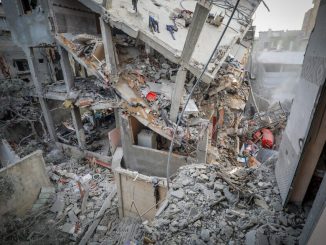
| Published April 22, 2025
The Israeli military said on Friday it had killed Hamas commander Hassan Farhat in the Sidon region of southern Lebanon. The strike also killed Farhat’s son, who was a member of the Palestinian militant group, and his daughter, according to Hamas’ military wing.
An Israeli drone strike in southern Beirut killed Hussein Atawi, a senior commander of the Sunni Islamist group Jama’a Islamiya. Atawi led the group’s armed wing, the Fajr Forces, which had previously launched rockets into Israel during the 2024 conflict. The Israeli military has not officially commented on the operation.
This strike follows a pattern of Israeli operations targeting militant leaders in Lebanon. For instance, on April 20, 2025, Israeli forces conducted a targeted airstrike that killed Hussein Ali Nasr, a senior Hezbollah operative responsible for smuggling weapons and funds into Lebanon .Wikipedia
Lebanese authorities and militant groups have condemned these actions as violations of sovereignty and the ceasefire agreement. The situation underscores the fragile nature of the current truce and raises concerns about potential escalation in the region.
Here are the implications of the Israeli drone strike that killed Hussein Atawi, a senior commander of Jama’a Islamiya, in southern Beirut:
🔥 Security and Military Implications
-
Continued Israeli Operations Post-Ceasefire
The strike reinforces Israel’s intent to conduct preemptive actions even after formal hostilities have ended—signaling that any perceived threats will be addressed without waiting for provocation. -
Weakened Militant Infrastructure
Atawi’s death may disrupt the Fajr Forces’ command structure, possibly limiting the group’s short-term operational effectiveness and reducing the risk of immediate rocket attacks. -
Heightened Risk of Retaliation
Jama’a Islamiya or sympathetic factions could retaliate with attacks against Israeli interests, possibly sparking new clashes along the Lebanon-Israel border or within broader conflict zones.
🌍 Geopolitical and Regional Implications
-
Strain on Lebanon’s Stability
The strike places additional pressure on Lebanon’s fragile internal political landscape. It could empower militant groups to justify further militarization while undermining state authority. -
Potential Hezbollah Response
Although Hezbollah was not the direct target, Israel’s activity in Beirut—Hezbollah’s stronghold—may be interpreted as a broader challenge, potentially drawing it back into active confrontation. -
Increased Regional Tensions
Cross-border operations in Beirut—particularly targeting Sunni militant factions—could pull regional actors into deeper involvement, especially those with vested interests in Lebanon or Israel’s military activity.
🏛️ Legal and Diplomatic Implications
-
Violation of International Norms
Lebanon has condemned the strike as a breach of its sovereignty and a violation of international law, which could lead to diplomatic pushback in forums such as the United Nations. -
Challenges to Ceasefire Credibility
The act weakens the credibility of ceasefire agreements in the region, potentially deterring future negotiations and fueling skepticism among regional mediators and external powers.
Overall Takeaway:
Israel’s targeted killing of Hussein Atawi in southern Beirut is a bold move that signals its continued commitment to neutralizing perceived threats beyond its borders—even during a ceasefire. While tactically successful, the strike risks reigniting tensions in Lebanon, drawing in other militant factions, and straining international diplomatic efforts aimed at maintaining regional stability.
This action underscores a clear message from Israel: it will act unilaterally to prevent future attacks, regardless of political fallout. However, such operations also blur the line between defense and escalation, leaving the ceasefire on increasingly shaky ground.
SOURCES: REUTERS – Israeli strike south of Beirut kills commander in Sunni Islamist group, statement says
DAILYMAIL ONLINE – Israeli strike south of Beirut kills commander in Sunni Islamist group, statement says
FRANCE 24 – Israel says it killed a Hamas commander in south Lebanon strike





Be the first to comment